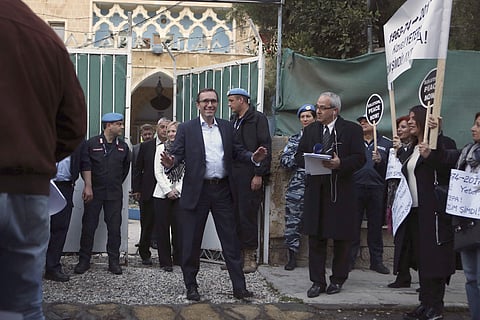

NICOSIA: Rival Cypriot leaders failed to set a date to restart stalled peace talks on reunifying the island after meeting for dinner in the UN-controlled buffer zone, the United Nations said. The dinner was hosted by UN envoy Espen Barth Eide for Greek Cypriot leader Nicos Anastasiades and Turkish Cypriot leader Mustafa Akinci yesterday, who met for the first time since talks were suspended in February.
A UN statement issued afterwards said more "groundwork" needed to be done after the two leaders "had an open and constructive exchange about the challenges experienced over the last months". It said the pair "exchanged ideas about the way ahead". "As the two leaders will be abroad in the coming days... Mr Eide, will be continuing his interaction with them in order to lay the groundwork for the resumption of the negotiations as soon as possible," said the statement.
The four-hour dinner was held at the Ledra Palace Hotel in the buffer zone in the divided capital, Nicosia. Outside the venue, scores of Greek and Turkish Cypriots chanted for a "solution now". Anastasiades and Akinci have been engaged in fragile peace talks since May 2015 that observers saw as the best chance in years to reunify the island.
But the UN-backed process came to a standstill in February in a row over Greek Cypriot schools marking the anniversary of an unofficial 1950 referendum supporting union with Greece. Akinci suspended his participation over the Cyprus parliament's approval of a move for Greek Cypriot schools to commemorate the poll. Since the bill passed, a climate of trust between the sides has deteriorated, with each blaming the other for the impasse. But MPs are expected to amend the bill, allowing the education minister, rather than parliament, to decide on such issues.
Much of the progress in recent talks was based on the strong personal rapport between Anastasiades and Akinci, leader of the breakaway Turkish Republic of Northern Cyprus. And there will be obstacles in place even when the negotiations resume as the leaders are still far apart on core issues such as power sharing, territorial adjustments and property rights.
Also added in to the mix is Greek Cypriot presidential elections next February and the Republic's search for oil and gas -- new drills are expected in June -- which Ankara wants to see stopped until peace talks have reached an outcome. The eastern Mediterranean island has been divided since 1974 when Turkish troops invaded the northern third in response to an Athens-inspired coup seeking Enosis, the term for political union between Greece and Cyprus.
After a failed referendum on a UN peace plan in 2004, the Cyprus Republic now headed by President Anastasiades joined the European Union as a divided country. The self-declared republic in the Turkish-held north is recognized only by Turkey.